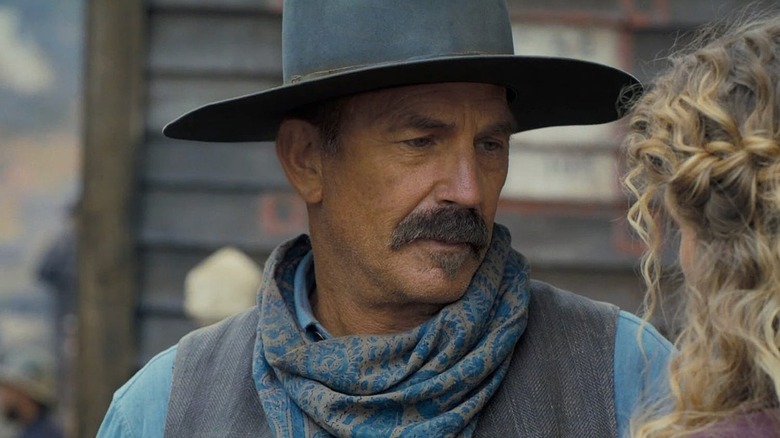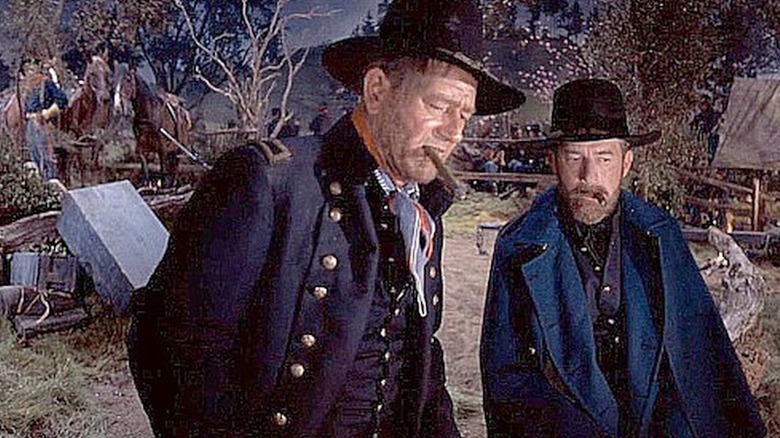The John Wayne Western That Changed Kevin Costner's Life
If you're ever fortunate enough to interview a great filmmaker, or simply find yourself occupying the same space as one and want to make the moment meaningful before it passes, you'll always get a genuine answer when you ask them to name the movie that made them fall in love with the medium. This may not be true in years to come, when creators who grew up during the downtick in theatrical exhibition and the explosion of TikTok craft art meant to be digested in 30-second morsels on your smartphone, but right now it is a near certainty that your favorite director got bit by the cinema bug while sitting in a darkened theater — and that's a memory they can access as fast as their first kiss (do not ask them about that).
Steven Spielberg can tell you all about Cecil B. DeMille's "The Greatest Show on Earth," while David Cronenberg might surprise you with his recollection of the trauma that "Bambi" wreaked upon his young conscience. Asking that question is a movie buff's secret handshake.
If the director has answered this question so many times that you know the answer (like Spielberg), you can craft your query to suit their career. When I was lucky enough to chat with Tom Hanks, I decided to get him talking on the Westerns the filmmaker Anthony Mann shot with James Stewart (the American movie star with whom Hanks is most frequently compared — and the answer was "Winchester '73"). Last summer, when I was presented with the possibility of chatting up Kevin Costner for his "Horizon: An American Saga – Chapter 1," I thought I'd ask him about the film that made him fall in love with the Western — not his favorite Western, but the one he (presumably) saw in a theater that got him all charged up to explore the genre. If I had done my homework before the interview, I would've discovered that he'd already answered that particular question (and known that it was a minor John Wayne effort).
How the West Was Won conquered Kevin Costner's young movie-loving heart
In a 2018 interview with The New York Times, Costner was asked if he remembered when he "first fell in love with the West." He was, unsurprisingly, quick with the answer. Per Costner:
"When I was 7, I saw "How the West Was Won" at the Cinerama Dome [in Hollywood] and one of the first images — coming across this lake that didn't have a ripple in it, like glass — was Jimmy Stewart in a birch-bark canoe. And I knew who I was at that moment. When he pulled that canoe up onto a beach, there was this group of exotic-looking people, and I thought: 'I'm interested in who they are. I'd like to live in a world where they are.'"
The moment so rattled Costner's cage that he carved out three canoes between the ages of seven and 18, with his ultimate goal being to paddle down the rivers made explored by Lewis and Clark. "I wanted to explore this America when it was like the Garden of Eden."
Cinematically, he began this adventure with "Silverado" in 1985, and has, in one way or another, paddle-stroked his way through the genre in a variety of ways via films like "Dances with Wolves," "Wyatt Earp" (produced by Costner, but directed by Lawrence Kasdan), "The Postman," "Open Range," "Let Him Go," and the "Horizon" movies. I've seen "How the West Was Won" in the Cinerama Dome, and while it's more of a prized motion picture artifact than a compelling feature (featuring Wayne as Union General William "Tecumseh" Sherman), I can only imagine how I would've felt had I seen the film in that magical theater at his age in the 1960s.
For Millennials, I would say that was Costner's "Jurassic Park" moment. Now that we know this, if you're ever lucky enough to speak to the man ... maybe ask him about his favorite paranoid thriller? You're on your own here. Just don't bring up Cal Ripken, Jr.

